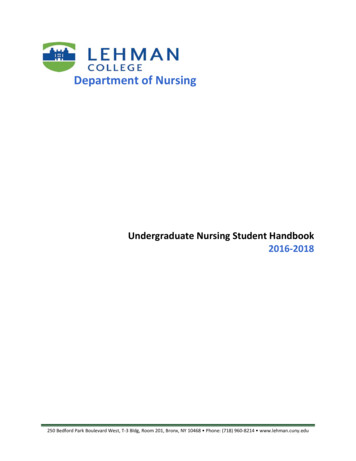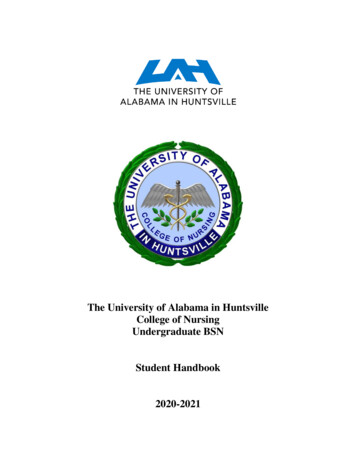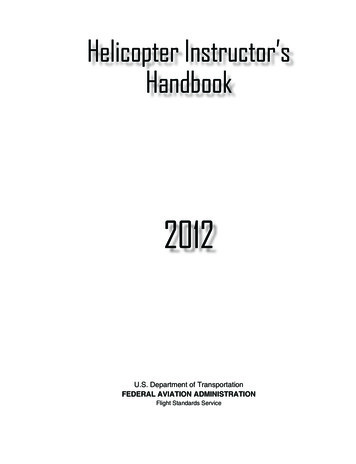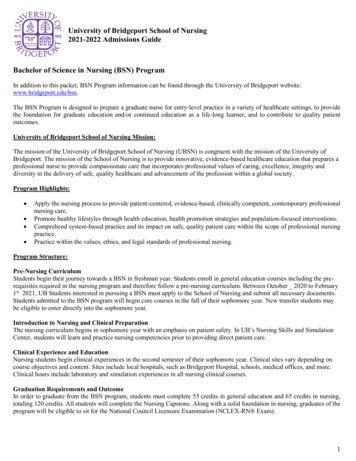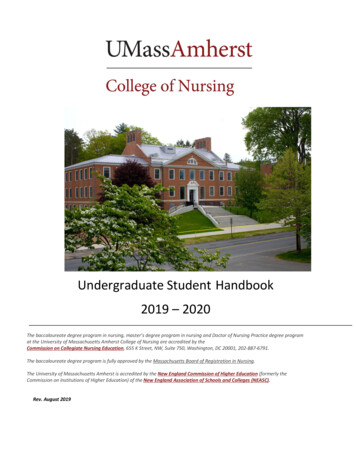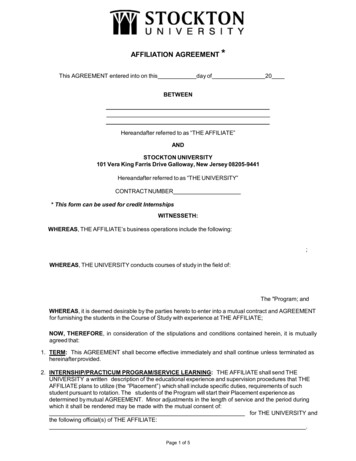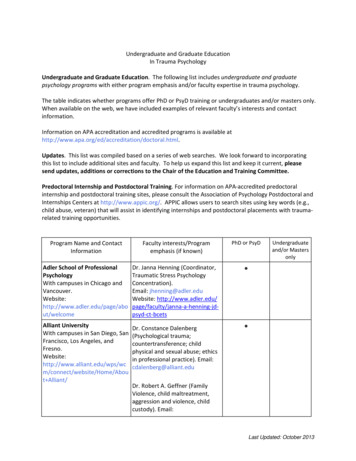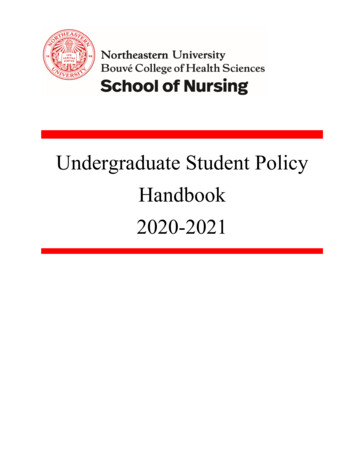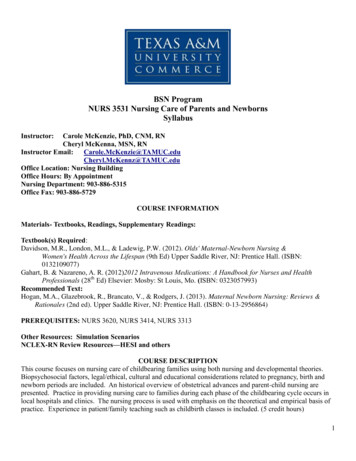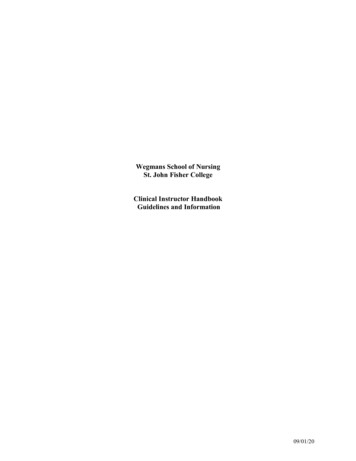
Transcription
Wegmans School of NursingSt. John Fisher CollegeClinical Instructor HandbookGuidelines and Information09/01/20
Table of Contents1.Introduction2.Instructor Clinical Compliance3.Clinical Schedules4.Clinical Hour Requirements5.Clinical Orientation Day6.Key Competencies That Need Reinforcement in All Settings7.Patient Assignments for Students8.Specific Clinical Guideline Reminders (the DO NOTs)9.Cell Phone, Mobile Device, and Computer Use10. Clinical Practice Incident Policy11. Undergraduate Clinical Course Coordinator Role12. Clinical Course Coordinator Site Visits13. Effective Communication with Nursing Staff and Health Care Team14. Student Evaluations15. Clinical Instructor Evaluation16. Preparation for Clinical17. Clinical Instructor Illness18. Using Web Mail and Your Fisher Network AccountAppendix A: Clinical Instructor Job DescriptionAppendix B: Social Media and Technology PolicyAppendix C: Sample Communication with Unit StaffAppendix D: Student Evaluation of Clinical InstructorAppendix E: Clinical Site Peer Evaluation of Clinical InstructorAppendix F: Clinical Course Coordinator Evaluation of Clinical InstructorAppendix G: Uniform PoliciesAppendix H: Unsafe Behavior PolicyAppendix I: Students Suspected to be Under the Influence of Drugs or Alcohol in the ClinicalSetting 9/01/20
Appendix J: Clinical Evaluation ToolAppendix K: Job Description for Clinical Adjunct FacultyIntroduction4253This handbook will serve as a guide to undergraduate clinical instructors for the WegmansSchool of Nursing (WSON) at St. John Fisher College (SJFC). Contact the clinical coursecoordinator or Associate Dean with any questions. Relevant documents needed for clinicalinstructors, as well as this handbook, will be posted on the WSON website in the UndergraduateClinical Instructor Documents, Forms and Tools tab: icalpreceptor-resources/Our goal is to have a consistent group of expert and competent clinical instructors who workwith students each semester. This consistency promotes excellence by allowing the instructor tobe familiar with the program standards, course outcomes, clinical expectations, WSON facultyand students. Clinical instructors should contact the relevant clinical course coordinator with theiravailability for the each semester. An email notice is sent before the semester starts for a specific clinical teachingassignment from the WSON Undergraduate Clinical Coordinator.A salary model is used that contracts for your time on a designated day of the week for the entiresemester Clinical Course Coordinators will work with clinical instructors regarding assignedactivities, responsibilities, and schedule.Requirements include: Completing the:o TeamSTEPPS training at your agency or at the WSON sessions – scheduled inAugust/September for fall starts and January/February for spring startso Clinical agency orientation (date and format varies by hospital/agency/site)o Competencies required by agency and unit including any required trainingso Online SJFC sexual harassment training (required on initial employment and asindicated by the college)o Unit orientation (the clinical instructor must contact the unit’s nurse managerdirectly to schedule the unit orientation)o Demonstration of clinical skills competencies as determined by coursecoordinator Provide feedback via email or the clinical form if required by clinical course coordinator Maintain communication with clinical course coordinator, including responding to emailsin a timely manner Meeting with the clinical course coordinator at the beginning of the semester, end of thesemester, and as needed throughout the semester09/01/20
Conducting mid-term and final evaluations with students (scheduled after a clinical day;must be completed outside of clinical hours) Completing an annual clinical instructor 360 evaluation with the clinical coursecoordinator Providing weekly review and feedback for all required student written work and clinicalassignments for the clinical course Documentinganecdotal notes on student progress Selecting appropriate patient assignments for students before each assigned clinical day Submitting compliance documents to the Undergraduate Clinical CoordinatorCollege contracts are done shortly before the semester starts. Clinical Instructors will be emailedby the provost’s office and asked to acknowledge the contract through FishRNet each semester. Once HR paperwork is completed, new clinical instructors can visit the Security office inHaffey Hall to get an SJFC ID (for library access) and parking stickers Instructors are paid every two weeks during the semester once they meet clinicalcompliance requirements. Clinical course coordinators will give all clinical instructors in their course access to thelearning resources on the Blackboard (Bb) site for the course. The clinical instructor job description is in Appendix A.Instructor Clinical ComplianceAll clinical instructors must be in compliance with NYSDOH and agency requirements beforethe beginning of the semester. All clinical instructors must have personal health insurancecoverage. The WSON Undergraduate Clinical Coordinator tracks WSON clinical instructorcompliance The following documents must be on file for each instructor and current for thesemester:o History and physical with subsequent annual health updateo Current BLS-CPR from American Heart Associationo Documentation of annual TB screening: blood test or PPD and CXR results if apositive reactiono Immunization documentation including Hepatitis B serieso Annual flu shoto Current resumeo Current NYS RN licenseoMedication Administration competency (from practice site or available atWSON - e.g. CNET or NLN med test)o Documentation of completion of TeamSTEPPS trainingo Documentation of Mandatory Review packet post-test if assigned clinical is not athome institution09/01/20
Clinical SchedulesClinical instructors are contracted to be available for assigned clinical day(s) of the week and apossible make-up day during the semester. The number of clinical days is dependent on credithours assigned for clinical according to the clinical course. Makeup days may be scheduled inadvance by the clinical course coordinator and may be on different days than the regular clinical.You will be notified in advance so you can adjust your work schedule accordingly.Labs Many courses start with on campus labs on the assigned clinical days for the first one tothree weeks of the semester. The purpose of the lab days is to ensure that students havereviewed the new content and skills for each course when they reach clinical. When oncampus labs occur the clinical instructor is responsible to be on campus with the studentsto assist the clinical course coordinator. These lab hours are factored into the students’time and clinical instructor’s contracted clinical time. Lab day responsibilities are to assist the students with skill development, answerquestions, and help manage the practice sessions. This is also a great time for you tobegin to develop relationships with the students in your clinical group. It may be helpfulto review parking and shuttle information (if applicable) before the first clinical day.Course Clinical HoursCourse clinical hours may include a combination of time with students inassigned clinical site or agency.laband practice at an NURS 300 Foundations are 3 credit clinical 9 hour clinical days (126 hours) NURS 317 Adult Health/Older I (M/S) are 3 credit clinical 9 hour clinical days (126hours) NURS 423 Adult Health/Older II (M/S) are 3 credit clinical 9 hour clinical days (126hours) NURS 323 OB (J2) are 2 credit clinical days 8-9 hr. days for shorter rotations (84hours) NURS 403 Psych (S1) are 2 credit clinical days 8-9 hr. days for shorter rotations(84 hours) and Simulation days as assigned NURS 431 Peds (S2) are 2 credit clinical days 8-9 hr. days for shorter rotations (84hours) NURS 429 Community (S2) 2 credits (84 hours) Clinical instructors and students are expected to be at the clinical site for the fullassigned hours/day each week—early dismissal is not an option.09/01/20
Clinical Hour RequirementsClinical instructors are expected to adhere to the clinical hours scheduled by the clinical coursecoordinator. Students should be at the clinical site for the entire scheduled clinical period andinstructors must provide oversight at all times. Pre and post-conference, lunch (30 minutes) and breaks can be scheduled to best meet thelearning needs of the students and the needs of the patients on the unit. Any change or variation from the normal clinical schedule must be communicated to theclinical course coordinator in advance for approval.Clinical Orientation DayClinical site orientation can range from half a day to a full clinical day. Clinical instructorsshould structure this time carefully. Suggested activities include: tour of the unit including mandated review of emergency & fire exits & equipment complete the attestation form required for each clinical group each semester on thefirst clinical day and return to the agency’s Director of Education/StaffDevelopment by the clinical instructor. This form is available on the UndergraduateClinical Instructor Documents, Forms, and Tools drop down on the website - HealthcareOrganization Orientation - Acknowledgment Statement for Affiliating Students and NonEmployed Professionals at: icalpreceptor-resources/ introduction to charge nurse and unit manager review unit specific documentation orient to the patient records (e.g., MAR, EMR, clinical care maps/care planning tools) locate necessary supplies for patient care review the course specific clinical evaluation tool and discuss expectations for dailypatient care, professional behavior and appearance, post-conference, arrival anddeparture times review due dates for weekly written work and agreement on method of communication(e.g., hard copies or electronic) complete registration for agency parking if neededClinical instructors and students should exchange contact information including email and phonenumbers, and establish the preferred method ofcontact on the first day of lab or clinical. Thiswill facilitate exchange of assignments and timely communication between students and clinicalinstructors.Student Expectations:*may not apply to all clinical settings09/01/20
Professional appearance & behavior Arrive on time & beprepared to care for assigned clients Appropriate and clear professional communication with clinical instructor,patients/families, site personnel, and health care team Use of SBAR and other TeamSTEPPS strategies* Rounding on patient(s) immediately after report* Basic comprehensive care at all levels - ADLs, glasses, dentures, mouth care, hair, skincare, nutrition, hydration, elimination, I & O, documentation Patient report for on & off shift: concise, relevant, prioritized Format for presenting a patient:*o Patient’s name and ageo Admission diagnosis(es)o Relevant medical/surgical/psychiatric historyo Relevant labs, test resultso Current priorities of careo Medications/potential side effectso Risk assessment: answer this question for each patient if this patient is going todevelop complications today (or “crash”)—what is the most likely cause and whatare the first signs and symptoms that the student/nurse should be assessing for?Do not tell students that they are practicing on your license—this is not true. Students have anexemption under the NYS Nurse Practice Act that allows them to do nursing functions as long asthey are supervised by an RN. Your responsibility is appropriate supervision.Patient Assignments for StudentsClinical instructors will plan clinical assignments and document them for the staff nurseassignment roster priorto student arrival at clinical. Examples of patients that students shouldnot be assigned to include: a patient who will be off the unit for most of the day for dialysis or othertreatment/procedure (unless the student will accompany the patient); a patient who will be in the OR (unless pre-op experience is the learning outcome andthey have additional patients or will go to the OR with the patient); a patient who has a particularly difficult family that the unit staff has had problem/issueswith; A patient who is very unstable A patient who has active respiratory TB or who is being ruled out for respiratory TB.Specific Clinical Guideline RemindersAll medication administration by students must be directly supervised by SJFC clinicalinstructor. This cannot be delegated to staff nurses, unless on a DEU or in the seniorpreceptorship. If students are late doing medication administration, clinical instructors may09/01/20
decide to return the responsibility for medication administration to the assigned staff nurse on theunit. Communication must be direct and specific with the staff nurse(s) if all scheduledmedications are being delegated or just those within a specific time frame.Based on consensus between all area hospitals and schools of nursing, undergraduatenursing students are restricted as to the skills they may or may not do in the clinicalagency. To access the most current document outlining the area hospital restrictions, SkillsGuidelines for RN Student Clinical Experiences, go to the WSON website .pdfIn addition to the restrictions listed in the document, students are NEVER allowed to dothe following in any setting: Administer any blood products Administer medications by IV push Administer chemotherapeutic agents of any kind Start IVs Perform venipunctureAll SJFC clinical instructors and students must be clearly identifiable by patients, familiesand staff by their St. John Fisher College ID to delineate they are not agency employees.SJFC name tags must be worn in all settings. Clinical instructors employed by the agencywho have an agency ID cannot wear the agency name badge and must have their SJFC IDclearly visible.Student patient assignments should be designated on a separate assignment sheet and leftas part of the unit record. The assignment sheet must include student and clinicalinstructor first and last names, clinical instructor contact information and informationabout patient assignments, student hours of care and which assignments includemedication administration.Cell Phone, Mobile Device, and Computer Use: Students and clinical instructors must reviewand adhere to the WSON Social Media and Technology Policy (see Appendix B).In addition, agency policy must be followed: No use of unit phones for personal calls. No use of unit computers for personal activities (email, Facebook, etc.). Do not download any patient specific information onto personal electronic devices. Do not post any information about clinical assignments, experiences, patients, students orinstructors on any cell phones, mobile devices, Internet or social networking sites. No pictures, video or audio are to be taken in clinical agencies.09/01/20
Clinical Practice Incident PolicyFor any event that requires an incident/occurrence report at the hospital or health care agency,the clinical instructor should contact the clinical course coordinator the day of the incident andcomplete the WSON Clinical Incident Form to document the event. The form is available on theWSON website. The completed form should be immediately returned to the Clinical CourseCoordinator who will review and forward to the Associate Dean.For follow-up related to an acute event involving student injury or accident, refer to theManagement of Clinic Incidents guide for all area hospitals located clinicalpreceptor-resources/Students all have personal health insurance and should be referred to their own health careprovider or the SJFC Wellness Center for follow-up care.Undergraduate Clinical Course Coordinator Role1. Revise and update the course syllabus including teaching and evaluation strategies,content, and learning resources in conjunction with the course description and learningoutcomes approved by the Undergraduate (UG) Curriculum Committee.a. Course description and learning outcomes cannot be changed without approval ofthe Committee.b. Changes in textbooks must be discussed with the Committee.2. Develop and manage the Blackboard course materials.3. Coordinate content sequencing with concurrent courses to promote effective studentlearning.4. Collaborate to schedule test and assignment due dates with other course coordinators inthe same semester to the same student cohort.5. Evaluate student achievement using all designated evaluation strategies outlined in thecourse syllabus.6. Calculate and enter final grades for each student on FishRNet.7. Evaluate each course offering according to the format designated by the UG CurriculumCommittee.a. Course evaluations must be completed at the conclusion of each semester andposted to the Course Evaluation folder in the UG section on the School of Nursingconfidential section of Citadel.b. Present the course evaluations and recommendations for improvement annually tothe UG Curriculum Committee.Clinical Course Coordinator Site VisitsClinical course coordinators will visit each clinical group in their courses each semester to assessthat the site is appropriate to meet the students’ learning needs and the student/clinical instructor09/01/20
relationships, communication, and expectations are appropriate to meet the learning outcomes ofthe clinical course.Site: The staff are supportive and collaborate with the clinical instructors and students to meetthe learning needs of the studento Sufficient numbers/variety of patients in the setting to accommodate studentlearning needs.o Sufficient numbers of RN staff (BS preferred) to work with studentso Instructors introduce themselves to the unit nurse manager and obtain feedbackthroughout the clinical to immediately address actual or potential issues andbroaden networks for future collaboration.Students: Meet the professional appearance and behavior guidelines of the WSON Work effectively with the clinical instructor and staff/providers. Progress toward meeting the clinical learning outcomes. Have the opportunity to let the clinical course coordinator know if there are any issuesthat they want to address related to the clinical instructor, staff, or unit.Instructor: Answer any questions and provide coaching and mentoring to support the professionaldevelopment of the clinical instructors. Validate that the clinical instructors’ expectations of student performance are appropriateand consistent across all groups in the same course. Validate that guidelines for clinical days are being followed by the clinical instructor(e.g., students are administering medications on a regular basis, assignments and writtenwork follow the expectations in the syllabus, students are completing the required hoursfor each clinical day, sufficient rigor is required for students in the daily presentation ofpatients/debriefing to stimulate and assess critical thinking).In-Hospital Clinical VisitsClinical course coordinators will support clinical adjunct faculty through frequentcommunication and site visits:a. 1 visit per semester for each experience (adjuncts with more than 2 previousclinical groups)b. 2 visits per semester for each new clinical instructor (less than 2 previous clinicalgroups)c. 2 or more visits per semester for any issues with instructors, students, staff nurses,etc.The number of visits will be determined by the need for coaching/mentoring of theclinical instructor or by the need for more observation of the student. Visits should bedocumented with specific interventions/observations and outcomes.09/01/20
Effective Communication with Nursing Staff and Health Care TeamIt is important that the students see clinical instructor role model effective communication withthe clinical site staff. One of the keys to success with your clinical experience is to establishrapport with clinical site staff at the outset. Many sites have several student groups over thecourse of a week and semester. This can lead to confusion on the part of the staff about whichtasks the students will be performing, if medications will be passed, and what documentationthey will be responsible for.Clinical course coordinators should communicate specific clinical group information to theclinical site nurse manager before the semester begins: clinical instructor name and contactinformation, dates and times of student rotation, goals and learning outcomes of the clinicalexperience (usually first page of clinical syllabus), and level of care skills the students will bepracticing while they are there (Appendix C).Each clinical instructor should attend the annual hospital instructor orientation and schedule aunit-orientation day for themselves prior to the beginning of clinical. This provides anopportunity to talk with managers, charge nurses, care managers and CNS staff. Inviting someof these leaders to meet and talk with the students during their orientation day encouragespositive working relationships. Students appreciate meeting staff they may be seeing regularlyon the unit, and it will familiarize key unit staff with your clinical group and the goals of theclinical rotation. Establishing clear lines of communication with key unit staff preventsmiscommunication and ensures a positive clinical experience. If issues do arise, please notifythe clinical course coordinator immediately to determine if follow-up is needed.Student EvaluationsFormal Mid-Semester Evaluation Schedule by the midpoint of the clinical rotation Meet with students outside of clinical hours Meet on campus or a designated area at the clinical site Complete the evaluation form found on the course Blackboard or WSON ing/clinicalpreceptor-resources/ The clinicalinstructor and student sign and date the form. The student’s Skills Checklist must beupdated.If you need to reserve a room on campus for student evaluations, contact the clinical coursecoordinator. Students complete the self-evaluations, and send them to their clinical instructor.These meetings take about 15 minutes per student.09/01/20
Encourage students to reflect objectively on their learning experiences and set relevant andchallenging goals for themselves. This evaluation is an important opportunity to sit with eachstudent and identify strengths and areas for improvement. If a student is not meetingexpectations, the assigned grade is “at risk”. The clinical instructor notifies the clinical coursecoordinator and fills out At Risk Clinical Performance f-nursing/clinicalpreceptor-resources/At Risk Status means that the student is not meeting professional expectations and/orclinical competencies. If the clinical instructor has questions about whether a studentshould be placed at risk, she/he should contact the clinical course coordinator for aconsultation. Using the At Risk Clinical Performance Documentation, a behavioralcontract will be established with the student that clearly outlines in measureable termsany areas that require improvement. This is reviewed by the clinical course coordinatorprior to discussing the risk form with the student. The student must demonstrateimprovement in these areas identified to receive a satisfactory final clinical evaluationand progress in the nursing program. The clinical instructor can consult with the clinicalcourse coordinator to identify any remediation opportunities to refer the student (e.g.,Learning Resource Center, additional readings, additional assignments, etc.).Remediation is important to ensure that students at risk have time to work onidentified areas that need improvement.Any student who a clinical instructor has concerns about meeting expected performance,competencies, or professional behaviors should be discussed with the clinical course coordinatoror site visitor as soon as issues are identified for further evaluation. Clinical course coordinatorswill make site visits to assess students who remain at risk in the second half of the clinicalrotation. The clinical instructor should have the clinical course coordinator sit in on the finalevaluation of any student who is not progressing to the next clinical course.The Final Clinical Evaluation uses the same form as the mid-semester clinical evaluation.The final clinical evaluation appointment should be scheduled outside of clinical hours. Studentsshould not hear about any weaknesses or issues at the final evaluation that have not already beenidentified. Problem areas should be addressed as the semester progresses and not presented to thestudent only at the end of the clinical rotation. The student’s Skills Checklist must be updated.Complete a narrative summary on the final evaluation (see example below). Note the student’sprogress related to: the type of unit/patient population/patient load time management/organizational skills communication skills knowledge base, skills, attitudes, behaviors expected for the appropriate student level readiness to progress to the next level clinical course(s) competency in medication administration safety - anyone who is not safe withmedication administration—should not be progressing09/01/20
professionalism and presentationSample final evaluation narrative:M. Smith provided high quality care to a 2-3 patient assignment of acutely ill patients on5-3600 (orthopedics) at SMH Demonstrated safe medication administration Demonstrated skills as identified in the Skills Checklist Improved in time management and organizational skills over the semester Worked well with student team, instructor and other health care providers on the unit Demonstrated clinical curiosity and sought new learning experiences Treated patients and families with respect and worked effectively with those from diversebackgrounds Continue to focus on integration of knowledge of drugs, labs and pathophysiology whiledetermining priorities of care and effective nursing interventions Demonstrates readiness to progress to the senior level clinical coursesClinical Instructor EvaluationA detailed job description for clinical instructors is in Appendix A. To support your professionaldevelopment and ensure that students are having high quality learning experiences, an annualevaluation process with the clinical course coordinator will occur that incorporates performanceevaluation, feedback from students, and a staff member. All evaluations are Qualtrics surveysavailable on the course Blackboard site.Process: Students complete an evaluation form for the clinical instructor in Qualtrics (AppendixD). The aggregate data is emailed to the clinical instructor at the end of the semester. Clinical instructors will forward one Peer Evaluation form to a charge nurse, nursemanager or other staff (Appendix E). Results of the evaluations are reviewed by the clinical course coordinator andincorporated into a formal evaluation that is reviewed with the clinical instructor at theWSON. Each year, your assigned clinical course coordinator/site visitor will make anappointment to meet with you at the end of the semester to a) review your evaluations ofstudents; b) review the peer evaluation form from the clinical agency; and c) review theinstructor evaluation forms completed by the students and clinical course coordinator(Appendix F). If evaluations indicate an area for improvement, the clinical course coordinator willreview and discuss strategies and expectations with the instructor. We are committed toyour ongoing professional development and satisfaction in the clinical instructor role. Clinical instructors with questions about the evaluation process or results should makean appointment to meet with the Associate Dean.09/01/20
In addition, students and clinical instructors complete the hospital generated siteevaluation for the unit/hospital they are assigned to each semester by email.Challenging SituationsAttendanceThere is little time during the semester to make up missed clinical hours. Each class has adesignated number of clinical hours required based on credit hours. Therefore, it is extremelyimportant that students attend all clinical days. Absences for any reason other than illness arenot acceptable. A clinical course coordinator will schedule makeup clinical days near the end ofthe semester. If makeup clinical days are not available, the clinical course coordinator willdetermine if students who miss clinical time will be given a written assignment to complete orthe student may be required to make up missed clinical hours in the simulation lab at the end ofthe semester. Students must also understand that they should not come to clinical if they are trulyill or injured in such a way that they cannot participate at clinical.FAQs Given to StudentsAre clinical days ever cancelled? Contact students in your clinical team and the agency unit if the college is closed. Allclinicals are cancelled when the college is closed. If the college closes because of a snow day—it is on the college website and announcedon local radio/TV stationso If you are already at the clinical agency, it is safer to stay there and complete theclinical day. Travel later in the day is usually safer. Use common sense—do not travel if your safety or student’s safety is at stake. Make-up clinical days are part of the schedule-discuss this with your clinical coursecoordinator.Students will ask you if they need a note from a health care provider if they miss clinical.They should be communicating with the clinical course coordinator about missed clinical time. One clin
School of Nursing (WSON) at St. John Fisher College (SJFC). Contact the clinical course coordinator or Associate Dean with any questions. Relevant documents needed for clinical instructors, as well as this handbook, will be posted on the WSON website in the Undergraduate Clinical Instructor
